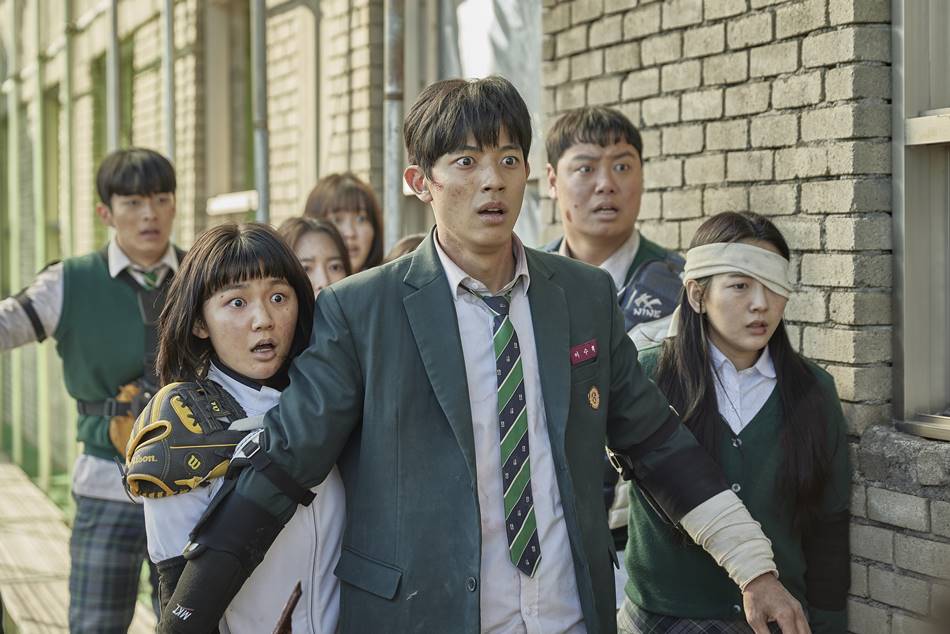
By Jae-Ha Kim
Teen Vogue
February 7, 2022
Within days of its January 28 release, All of Us Are Dead became the most-watched Netflix series on its global streaming chart – a feat previously achieved by Squid Game and Hellbound in the latter part of 2021. Like those other South Korean original series, All of Us Are Dead is graphic and brutal in its depiction of modern Korean society. But this time around, the storyline focuses on a group of high school students whose lives are endangered when a virus turns friends (and some enemies) into zombies. (Spoilers for All of Us Are Dead ahead.)
MV Sewol Ferry Disaster
In a series that touches on real socio-political issues, the parallels to the Sewol ferry tragedy stand out. On April 16, 2014, the MV Sewol ferry was headed from Incheon to Jeju Island when it capsized. Sixty-four percent of the 476 passengers, which included 250 students from Danwon High School, died. Once the news broke internationally, the western media began cranking out xenophobic articles suggesting that the South Korean children perished because they had been raised not to question authority. The Dallas Morning News went so far as to hypothesize that “…Americans – and certainly Texans – value the individual over the group. If that was a boatload of American students, you know they would have been finding any and every way to get off that ferry. But in Asian cultures, which place the needs of the group over the needs of the individual, compliance is de rigueur. So, you end up with this horrendous death by obedience.”
Death. By. Obedience.
They failed to mention students like Jeong Cha-woong, a 16-year-old Danwon student who died trying to save his classmates. He gave his own life jacket to a friend, who survived. Cha-woong didn’t die by obedience. He died as a proactive hero, something no teenager should have to be.
In many ways, All of Us Are Dead is a counterpoint to those kinds of racist views, which are perpetuated by stereotypes of Asians being docile followers who are incapable of thinking outside of the box. Early on, On-jo (Park Ji-hu) tells her classmates, “We have to wait to be rescued.” But when it becomes clear that they have been dismissed by the government as disposable collateral, they band together to save each other. They use ingenuity to bolster their chances of survival. With the exception of a few hateful characters who go rogue, the children show compassion for each other – especially the injured who will slow down their progress, but who they refuse to 버려 (throw away like garbage).
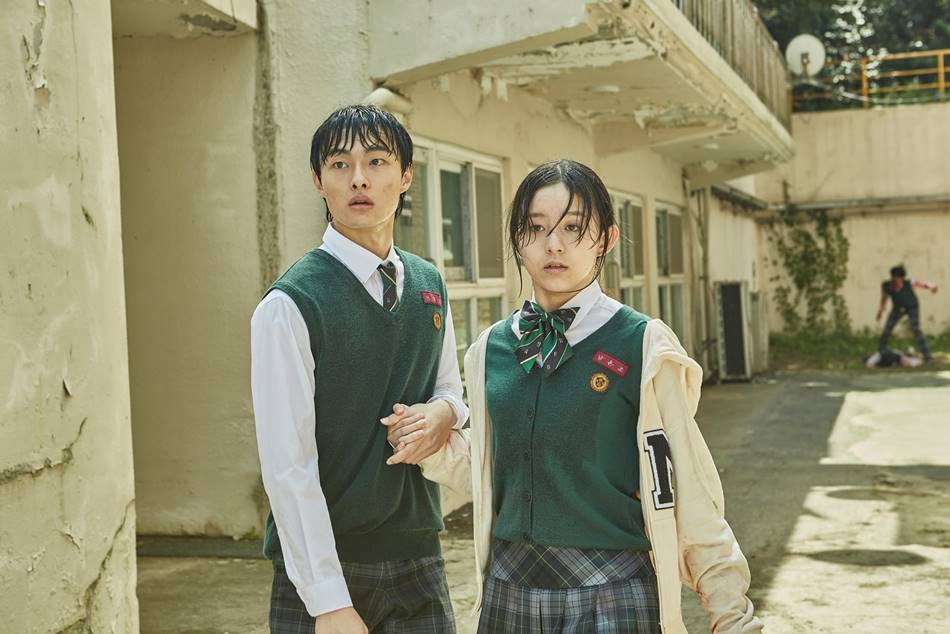
Feminism and Women Athletes in South Korea
At the 2020 Summer Olympics held in Tokyo, South Korea’s An San became the first ever archer to win three gold medals at one Olympic Games. While most Koreans celebrated her historic achievements, there was a subset of men’s rights activists and misogynists who derided the 20-year-old champion for having short hair, which they conflated with feminism – which they are against.
In All of Us Are Dead, Ha-ri (portrayed by Ha Seung-ri) is an archer whose expectations of entering a national sports university end when she fails to win an elite competition. Instead, she finds herself back at her high school searching for her younger brother, Woo-jin (Son Sang-yeon), and using her archery skills to slay the undead.

While she is traditionally beautiful with long hair, she develops an unlikely friendship with Mi-jin (Lee Eun-saem), who is foul mouthed (and sports short hair). These two sunbaes – or senior classmates – take charge of the younger students. As the elder members, they willingly place themselves in danger so they can protect the others. Earlier, Ha-ri’s coach had berated her in front of her teammates, chastising her for being a loser who has no chance of winning an Olympic medal or securing a future for herself. In the end, she utilizes all her skills to accomplish something much more important than winning first place. She saves lives.
School Bullying
The series starts off with an intense depiction of school violence. A group of students brutally beat and torment a child so severely that the forthcoming graphic zombie scenes pale in comparison.
When one of the girls is sexually assaulted and filmed, only one boy tries to rescue her. But she returns to the bullies, because she points out that if she leaves, the boys will do worse to her the next day. She has little support from her classmates. When a boy slut shames her, the other girls don’t offer any compassion. Rather, they laugh at her, too. The school administrators refuse to report the crimes to the police. And when the girl finally does confide in a teacher, he places the blame on her. “The ones who get bullied have a problem, too,” he says. “The kids must have a reason for bullying you.” When she realizes the video footage of her will be released online, she contemplates suicide.
While bullying is a worldwide problem, South Korea’s hyper-competitive educational system has been cited as one of the reasons why children torment each other. The issue is compounded by the internet; according to Statista’s 2018 data, South Korea ranks near the bottom in overall awareness of cyberbullying. And students are also ostracized for being poor. Gyeong-su’s (Ham Sung-min) family is on welfare, which makes him a target of snobs like Na-yeon (Squid Game actress Lee Yoo-mi). But as she points out, even his friends laughed behind his back when she made fun of the way he smelled.
Bullying is a hot-button topic in Korea and an issue that netizens feel strongly about, even if the coercion supposedly stopped after the perpetrators graduated from school. When a victim came forward last year to accuse actor Kim Ji-soo of having bullied and beaten classmates during his middle school years, the outcry was immediate. He was dropped from his lead role in River Where the Moon Rises and quickly enlisted for mandatory military duty.
On the whole, All of Us Are Dead portrays the deadly ramifications of school bullying in a way that speaks to South Korea’s specific school situation, as well as the experiences of bullying victims around the world. Before being bit, Gwi-nam (Yoo In-soo) was a low level bully who did as he was told. Afterwards, he mutates into a zombie who is seemingly indestructible. But he is far more frightening than the zombies who kill to satiate their hunger, because he has retained a very human trait: vindictiveness. As with most of the bullies – even those who became zombies – his fate doesn’t end well.
Academic Stress
South Korea ranks no. 1 as the most educated country in the world, according to the Organisation for Economic Co-operation and Development (OECD), with the majority of children enrolled in private for-profit institutions like hagwons, where students receive supplementary education. It’s no coincidence that one of the show’s most thrilling brawls occurs in the school library, with two boys fighting each other atop bookcases.
All of Us Are Dead’s Nam-ra (Cho Yi-hyun) is ranked at the top of her class and is constantly studying to maintain that position. Even as other students are freaking out about the infestation of zombies, she is blissfully unaware as she walks around campus with her earbuds on and her nose in a book. On-jo is at the other end of the academic spectrum. But instead of punishing her for not doing better in school, her firefighter father tells her to be healthy and happy, and to stop worrying about not being smart enough to be admitted to Seoul National University.
In K-dramas such as SKY Castle, The Penthouse trilogy, and Melancholia, the high school students’ collective goal is to attend one of Korea’s top three universities – a feat not possible for most. But in All of Us Are Dead, the series depicts a playing field where survival is dependent on ingenuity and humanity, traits not necessarily learned in a classroom. Horror comes in many forms, and a low GPA is inconsequential by comparison.
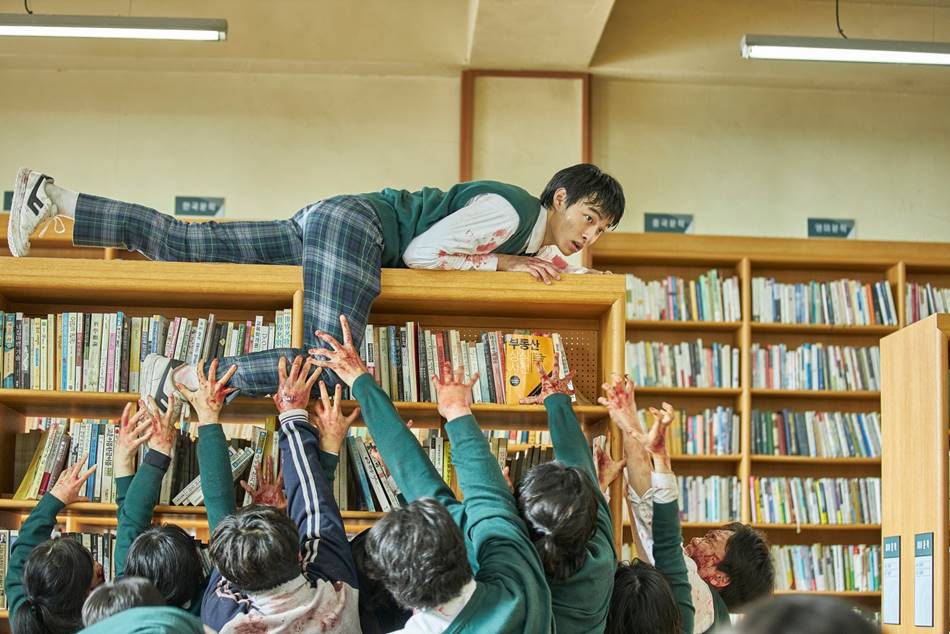
Fat-Shaming
Of all the OECD countries, South Korea has the second lowest obesity rate. And just about any Korean will tell you that talking about someone’s body size is the norm in Korea. Parents will tell their children to eat more, but then complain that they need to lose weight. Even in a zombie apocalypse series like All of Us Are Dead, fat jokes abound. Dae-su (played by Im Jae-hyuk) is one of the strongest boys at school and an integral part of the teens’ survival. He also has a beautiful voice and dreams of becoming a singer. But when he auditioned, it was his body – and not his voice – that was evaluated. He was told to lose weight, something countless idols also heard in real life.
At the end of the series, six students – as well as other teens who were bitten, but are able to control their urges to kill others – survive. Dae-su is one of them. Instead of playing off his girth as a negative that impedes his survival, All of Us Are Dead depicts him as a hero. While it may not have been intentional, his endurance is a profound commentary about what constitutes a strong body and mind.
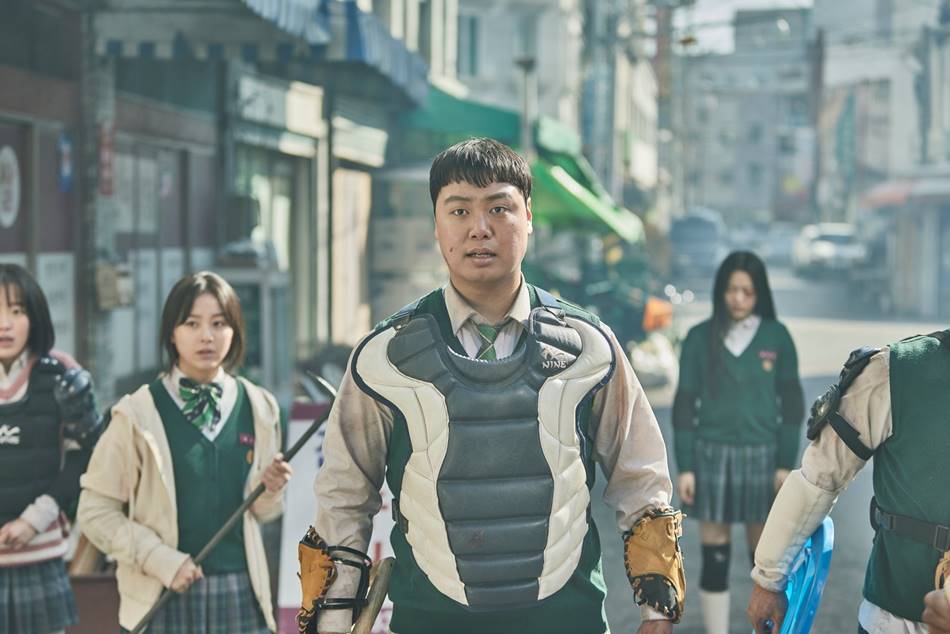
The Failures of Adults, Specifically Military and Police Leadership
Sewol ferry captain Lee Joon-seok not only failed to properly evacuate the passengers, which could have potentially saved hundreds of lives, but he also abandoned ship after telling the passengers to stay put. He was one of the first to be rescued by the coast guard.
For about half of All of Us Are Dead‘s 12 episodes, the students are hopeful that police officers or soldiers will rescue them. But they are repeatedly let down. When the military does finally arrive to extract the teens, their commander gives his troop a last-minute order to return to headquarters without the teens (due to fears that the kids may be asymptomatic virus carriers). Aside from one teacher, who tries to protect the students, the majority of adults at school concentrate only on saving their own lives and listening to the top administrators, whose goal is to protect the school’s reputation. Adults who do try to save the children – like On-jo’s father (Jeon Bae-soo) – are depicted as outliers, whose defiance of the command chain will result in their being punished for their actions.
Viewers certainly can enjoy All of Us Are Dead without having an understanding of the global issues weaved into the storylines. But it’s the real-life narratives that elevate this K-drama from just another zombie horror series into something more relevant and important. Ultimately, it speaks to all age groups about how adults should – and can – do better. But when they don’t, the kids will do everything in their power to be alright.
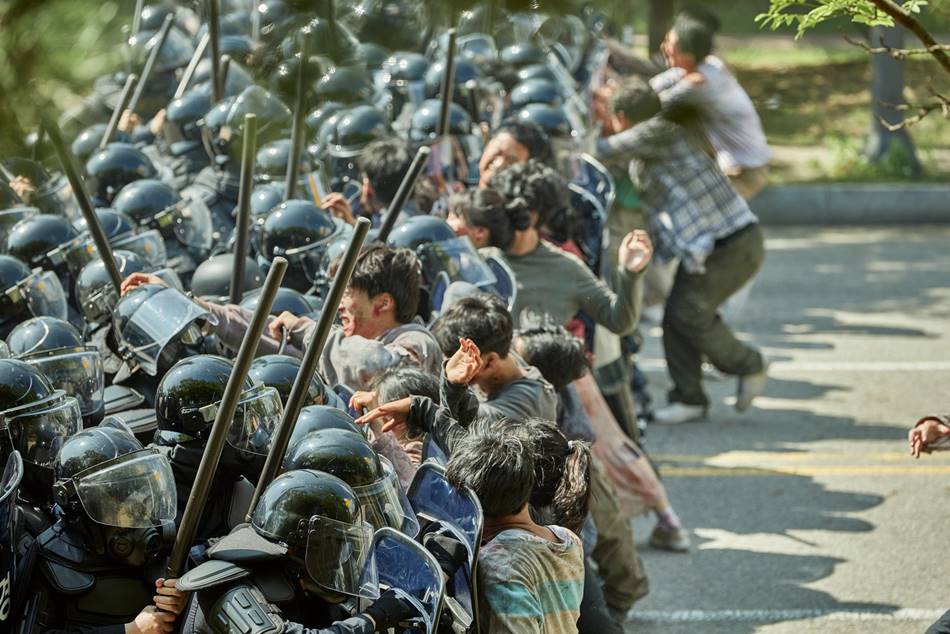
Airdates: Twelve episodes — each about 60 minutes — released on Netflix on January 28, 2022. All photos courtesy of Netflix and Teen Vogue.
© 2022 JAE-HA KIM | All Rights Reserved






Great piece as always. I agree, and for me, the zombie apocalypse was just the background for the various societal issues the show addresses. And the spotlight felt especially strong on how the teens felt completely abandoned by adults
This was the best breakdown of the series I’ve read. Thank you so much! I find it so interesting when history is woven into story arcs!
Finally, a great piece on Netflix’s “All of Us Are Dead” topics that touch on the Sewol tragedy, bullying, feminism, military and police leadership and more.
Your writeup aligns so much with what I felt about the series. Very good storytelling, with so many real world issues that rather than confusing things, enriched the story for me. Thank-you for a great piece.
Whole package of korean socio-politics issues in one go series. I thought it was just abt bullying, education and sewols matters, turned out into something bigger than it seemed #AllOfUsAreDead
haven’t even watched the series but still a v insightful read ty 😊
THIS ARTICLE 💯💯💯 WHAT A GREAT PIECE. Thank you for your discernible insights👏👍 THIS IS HOW YOU WRITE AN ARTICLE. Thank you👏
Love this, as always by @GoAwayWithJae